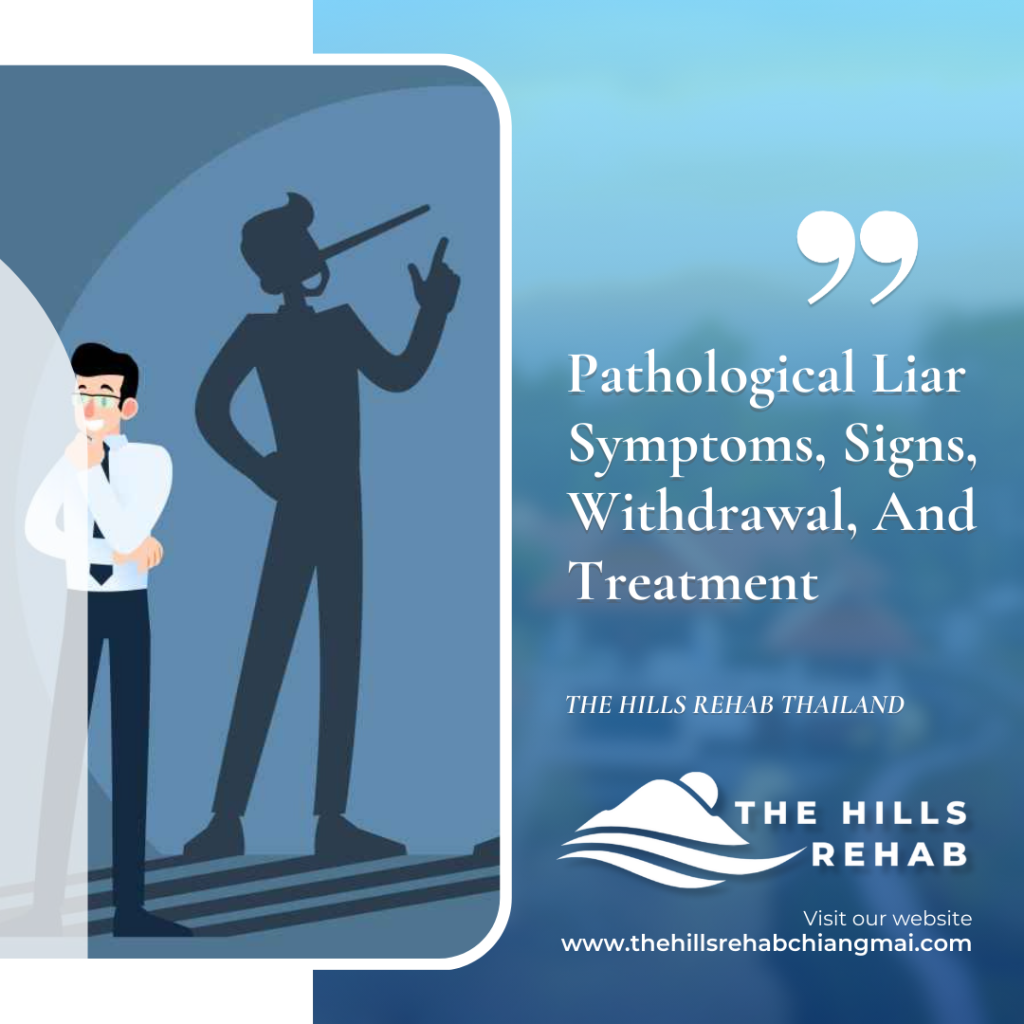
Pathological Liar : Pathological lying , also known as pseudologia fantastica or mythomania, is a chronic behavior characterized by habitual or compulsive lying. Unlike occasional lying, which most people do from time to time, pathological lying is a consistent pattern of behavior that can interfere with a person’s relationships, work, and overall quality of life.
Choosing The Hills Rehab for addressing pathological lying can offer several advantages that contribute to effective treatment and recovery:
Specialized Programs: The Hills Rehab may provide specialized programs tailored specifically for individuals struggling with pathological lying. These programs can include cognitive-behavioral therapy (CBT), dialectical behavior therapy (DBT), and other evidence-based approaches designed to address the underlying psychological issues contributing to pathological lying.
Experienced Staff: The facility likely employs experienced mental health professionals, including psychologists, psychiatrists, and therapists, who are trained to work with individuals exhibiting complex behaviors such as pathological lying. Their expertise can be crucial in accurately diagnosing and treating this condition.
Holistic Approach: The Hills Rehab might offer a holistic approach to treatment, addressing not only the pathological lying but also any co-occurring disorders such as anxiety, depression, or substance abuse. This comprehensive approach can lead to more sustainable recovery outcomes.
Personalized Treatment Plans: The rehab center may create personalized treatment plans that are tailored to the specific needs and circumstances of each individual. This customization can ensure that the treatment is effective and aligns with the patient’s unique challenges and goals.
Supportive Environment: A supportive and structured environment can be essential for individuals struggling with pathological lying. The Hills Rehab may provide a safe and nurturing setting where patients can focus on their recovery without the distractions and triggers present in their everyday lives.
Aftercare and Support: The facility might offer robust aftercare and support programs to help individuals maintain their progress after completing the initial treatment. This can include continued therapy, support groups, and other resources to prevent relapse and support long-term recovery.
Confidentiality and Privacy: Privacy is often a significant concern for individuals seeking treatment for sensitive issues like pathological lying. The Hills Rehab likely ensures a high level of confidentiality, providing a discreet and private setting for recovery.
If you have specific details or questions about The Hills Rehab, such as their treatment methodologies or patient success stories, feel free to share them, and I can provide more detailed information.
Pathological lying can be a symptom of several underlying psychological conditions, including:
Consistent and Unexplained Lies: Pathological liars often tell elaborate and unnecessary lies that are easily disproven.
Lack of Remorse: They may not feel guilt or remorse for their lies, even when confronted with evidence.
Impulsivity: A tendency to lie impulsively without considering the consequences.
Manipulative Behavior: Pathological liars may use their lies to manipulate and control others.
Unstable Relationships: Difficulty maintaining stable and trusting relationships due to the erosion of trust caused by their lies.
Pathological liars may face social withdrawal and isolation due to the breakdown of relationships caused by their dishonesty. Trust issues can lead to strained connections with friends, family, and colleagues.
Psychotherapy (Counseling): Cognitive-behavioral therapy (CBT) and psychotherapy can help the individual identify and address the underlying issues that contribute to their lying behavior. It can also teach healthier coping mechanisms and improve communication skills.
Medication: In cases where lying is a symptom of an underlying mental health disorder, medication may be prescribed. For example, if the lying is associated with impulse control issues, medications that target impulsivity may be considered.
Support Groups: Group therapy or support groups can provide a sense of community and understanding for individuals dealing with pathological lying.
Addressing Underlying Issues: It’s crucial to identify and address any co-occurring mental health issues, such as antisocial personality disorder or obsessive-compulsive disorder, that may contribute to pathological lying.
Family Involvement: In some cases, family therapy may be beneficial to address interpersonal dynamics and provide support for both the individual and their loved ones.
It’s important to note that successful treatment often requires the individual’s commitment to change and the support of mental health professionals and loved ones. If you suspect someone may be a pathological liar, encouraging them to seek professional help is a constructive step.
Are you in need of assistance on your journey to recovery? Contact us. We are here to help. At our reputable rehab center, we offer a complimentary consultation to provide guidance and support tailored to your specific needs.
"*" indicates required fields
TH:
USA/CAN:
Thailand :
UK:
AUS:
Whatsapp: